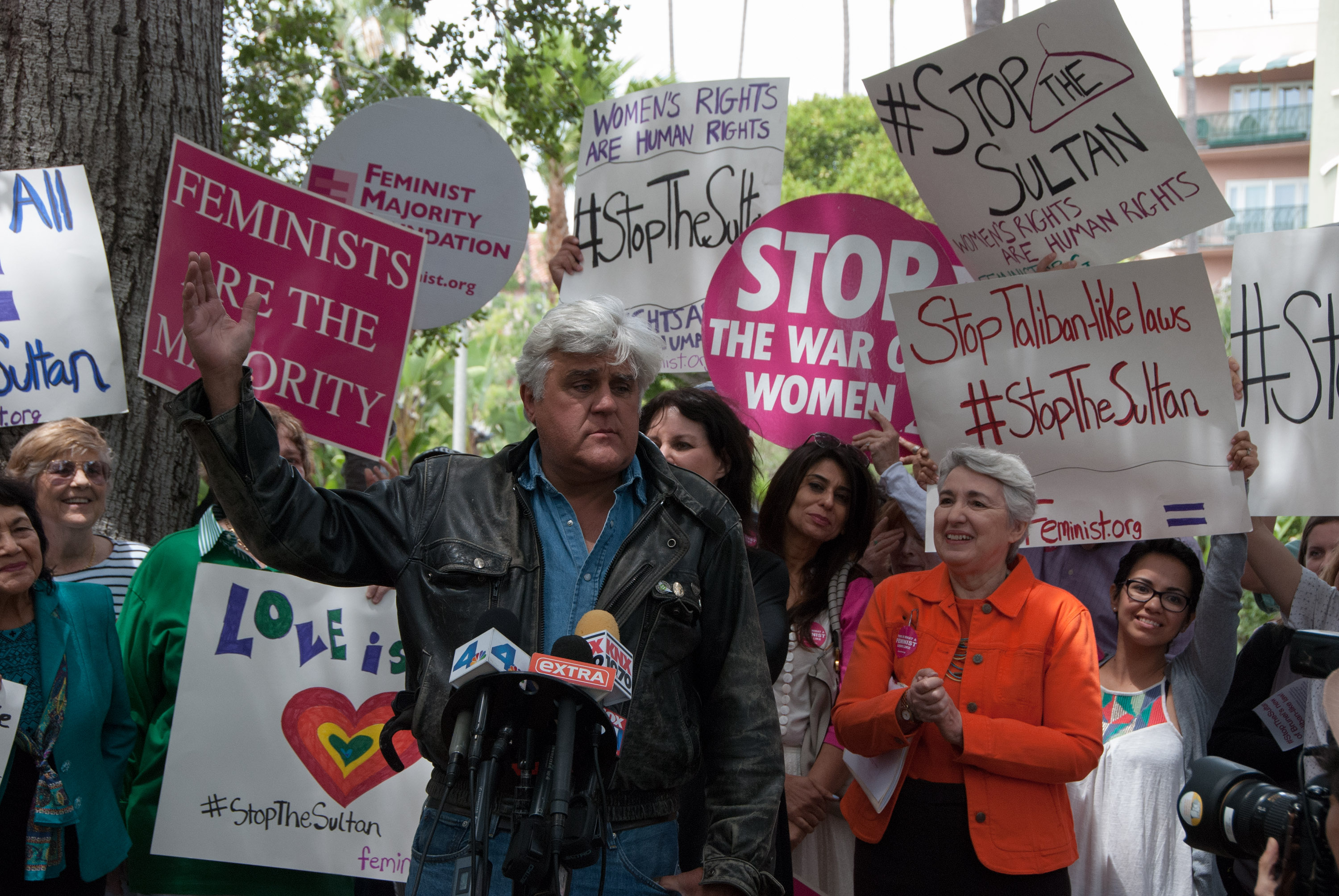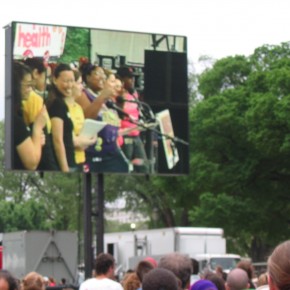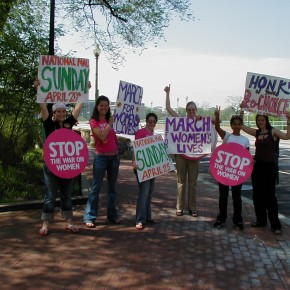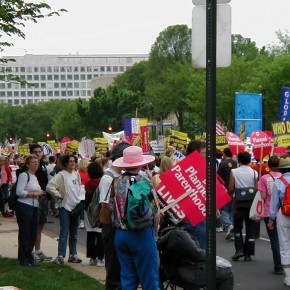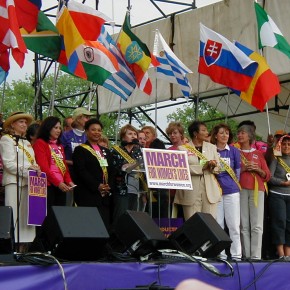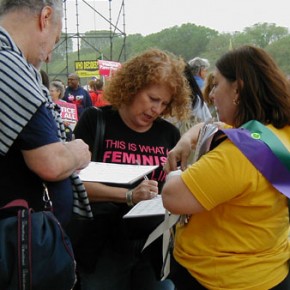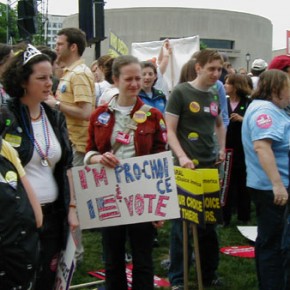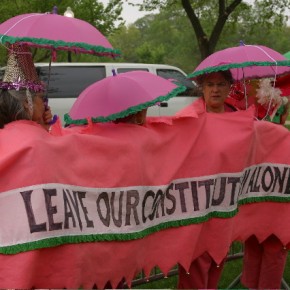The most recent string of reports from the border demand our attention—and our action.
Earlier this month, the Homeland Security Inspector General released a scathing report detailing overcrowding and other inhumane conditions at detention centers along the border, much of which has been confirmed by recent visits to facilities by lawmakers.
“After I forced myself into a cell with women and began speaking to them, one of them described their treatment at the hands of officers as “psychological warfare,” Rep. Alexandria Ocasio-Cortez tweeted after a visit to a center in El Paso, Texas. “This has been horrifying so far.”
Feminists have been fighting back against the Trump administration’s shameful treatment of migrants since last summer, when a zero-tolerance policy instated by the president resulted in thousands of children being forcibly separated from their families and officials announced that women seeking asylum from abuse and sexual violence would no longer be eligible for shelter in the U.S.
As the border crisis persists, so must we. No matter where you live or what means you have available, you can take action today. Here’s 10 ways to start.
#1: Take to the Streets
Earlier this month, activists made headlines by holding hundreds of #CloseTheCamps protests across the country in opposition to inhumane conditions at detention centers and dehumanizing practices by ICE—but the march toward justice goes on.
On Friday, July 12, Lights for Liberty vigils nationwide will make space for lawmakers, advocates and individuals to show solidarity with migrants and honor the memory of those who have died in detention center. You can find the Lights for Liberty event nearest you in their database.
#2: Volunteer Your Time
Show up for migrants by showing up where you’re most needed—as a volunteer providing key support services to the leaders of this fight.
The International Rescue Committee has an extensive database detailing all of their volunteer opportunities across the U.S.—including chances to help with citizenship training and teach English to resettling individuals. The U.S. Committee for Refugees and Immigrants also provides a number of both remote and local volunteer opportunities, and Stand With Immigrants can help you connect with activists on the ground wherever you are.
Volunteer lawyers, translators and CBP monitors are also critically needed at specific sites along the border. Organizations like the ABA, ACLU and Translators Without Borders can help you put your legal and linguistic expertise to good use in this moment.
#3: Keep the Movement Strong
Organizations agitating for immigrant justice, providing critical resources to migrant families and working to advance policies that protect immigrant and refugee families need support more than ever in this current moment. Consider giving a tax-deductible gift to RAICES, International Rescue Committee, Women’s Refugee Commission, ACLU and Immigrant Families Together today to fuel their urgent work.
#4: Help Detained Migrants Post Bail
Posting bail for detained migrants stops their lives from being interrupted and disrupted in the time before their court date. Bail bond funds, which are reserves of money allocated to posting bail for immigrants nationwide, make that possible. Consider donating to the Freedom for Immigrants’ National Bond Fund and the Fianza Fund today.
#5: Send Supplies (and Airline Miles!) to Migrants
Material donations can be critical for migrants at the border or immigrants recently released from detention. You can donate toiletries, canned food and other non-perishable items in-person or through mail to the U.S. Committee for Refugees and Immigrants and No More Deaths. Your extra air miles can make a difference as well: Miles4Migrants uses them to reunite immigrant and migrant families by plane.
#6: Visit a Detention Center in a Show of Solidarity
Showing up outside of a detention center to protest is powerful and important—but for the individuals inside, walking through the front doors could be more immediately meaningful. Visiting one of the detention centers across the country is one small way to show solidarity with the migrants inside.
Freedom for Immigrants has existing visitation programs in some states, as well as information on how to create one and what to prepare for when visiting. Other organizations also provide lengthy guides on how to create local visitation programs and what to expect when visiting, including the Women’s Refugee Commission and the Detention Watch Network.
#7: Make Room for Refugees—and Support Your Newest Neighbors
If you have the means and have a safe, spare room or shelter, you could consider being a host for refugee families at Room for Refugees. Organizations like Miry’s List and the Syrian Supper Club also provide local support to resettling families and individuals—and connect them to their larger community.
#8: Stay Informed
Now is the time to study the background on U.S. immigration; learn about apprehensions at the border in six charts and read this timeline detailing what’s happened so far in family separations. Keep your eyes wide open. We must remain vigilant.
#9: Talk to Your Lawmakers
Especially if you live in states along the southern border or ones that support the border facilities, calling your representative can let them know that their constituency—the population whose votes they’ll be campaigning for come 2020—cares about migrants and opposes the abusive conditions that they’re subjected to. Here’s a searchable directory to find your representative and their contact information, and organizations like YouLobby, the ACLU and Indivisible East Bay provide call scripts and tips.
#10: Vote!
It’s almost time for the 2020 elections—and one of the best things you can do is vote for state and federal lawmakers who are committed to ending the human rights abuses at the border and advancing a political agenda that grants migrants, asylees and refugees the dignity and opportunity they deserve.
Feminists can make a difference at the polls. Register to vote today, and urge your friends, family members and neighbors to do so, too. When we vote, we win—and families at the border are counting on us to speak up when it matters most.












